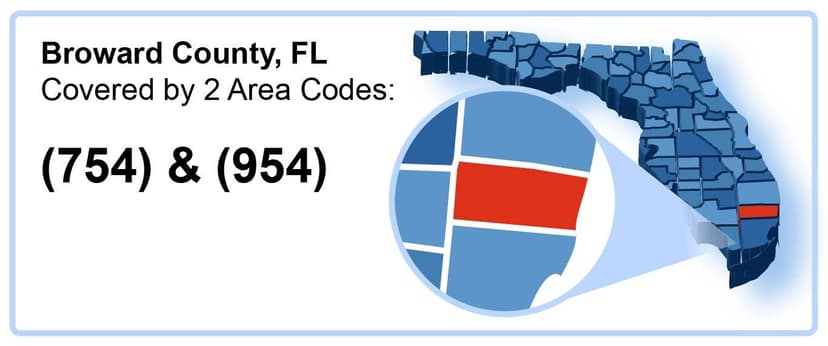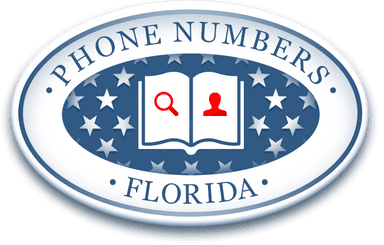What are Broward County Area Codes?

Area codes are three-digit numbers preceding local phone numbers, which specify Numbering Plan Areas (NPAs) within states. These NPAs are assigned by the North American Numbering Plan (NANP). In Broward County, the Florida Public Service Commission (PSC) is tasked with introducing and managing area codes.
Two area codes serve Broward County and they cover all the cities within the county.
Area Code 754
Area code 754 is the single NANP overlay area code for the 954 numbering plan area in Broward County. It was activated for service in August 2001.
Area Code 954
Area code 954, is the Florida telephone area code in the NANP that serves all of Broward County. It covers cities like Fort Lauderdale, Hollywood, Coral Springs, Pembroke Pines, and Miramar.
What are the Best Cell Phone Plans in Broward County?
Cell phones are increasingly being chosen over landlines by many households in Broward County. The National Centre for Health Statistics, in a 2018 survey, estimated that 60.9% of adult Floridians (above 18 years) only use wireless phone services. Conversely, only about 4.0% of adults used landlines exclusively. This gap widened more markedly among Floridian children aged below 18 years. Approximately 72.9% of them used only wireless phones compared to 1.7% who relied only on landlines. This report is evidence that cell phone usage has overtaken landline use and is the preferred phone option for most people in the state.
The four biggest phone carriers are present in Broward County, and they generally offer excellent coverage. Verizon has the widest network coverage with service in 99.2% of the county. It is closely followed by AT&T, which provides 99.1% coverage, while T-Mobile and Sprint have 89.7% and 83% coverage respectively.
Like cell phones, residents’ preferences for VoIP (Voice over Internet Protocol) services have also risen significantly in Broward County. Rated as one of Florida’s most urbanized counties, 93% of county residents have a computer or a smartphone while 84.7% have internet access. These make it easier for residents to readily adopt VoIP phone services.
What are Broward County Phone Scams?
These are the different fraudulent phone-based schemes aimed at either fleecing county locals or stealing their sensitive information to commit identity theft. The Broward Sheriff’s Office (BSO) and Consumer Protection Board actively inform and protect consumers within the county from scams. Residents can employ reverse phone number lookup services to unearth scammers’ identities, and foil attempted scams. Scammed county inhabitants can also report violations online or lodge complaints with the FTC. Phone scams commonly reported in Broward County include:
What are Investment Scams?
Using false guarantees of high returns, scammers exploit their targets’ desire to earn more on their investments. They call unsuspecting victims, offering them once-in-a-lifetime business investment opportunities with little or no risks attached. Scammers often pretend to represent credible organizations and use aggressive sales pitches to pressure their marks into investing. Ranging from investments in gemstones and rare coins to art frauds and Ponzi schemes, these opportunities are aimed at milking consumers. A free reverse phone lookup can assist consumers in ascertaining the legitimacy of callers promising high returns on no- and low-risk investments. Affected consumers can report online to the Florida Office of Financial Regulation (FLOFR) or by calling toll-free on 1 (800) 848-3792.
What are Utility Scams?
Scammers, posing as employees or contractors of Broward County Water and Wastewater Services, attempt to trick residents into parting with their money or personal information. Sometimes, they attempt to sell products and services to their targets while pretending to be official agents of Water and Wastewater Services. In other cases, scammers use threats of service disconnection or account closure to make consumers provide financial information or send payments.
Residents are reminded that Water and Wastewater Services will never call for personal information. Residents can call (954) 831-3250 to verify employees’ or contractors’ identities or affiliations. Victims of this scam can also file written complaints. Basic identifying information like names and contact details of scammers can be retrieved using reverse phone lookup free services.
What are Lottery and Sweepstakes Scams?
Seniors are often targeted by this scam where a scammer calls with the “good news” of lottery winnings paying out huge amounts of money. Winners are, however, asked to pay advance fees to secure their lottery winnings. They may also be asked to provide their credit card information for “verification”. After initiating first contact by phone, scammers send official-looking letters to their marks purportedly originating from legitimate sweepstakes companies. Authentic lottery and sweepstake companies do not require upfront payments to claim prizes or winnings. Persons targeted by these scams can conduct phone number lookups free of charge to unmask the identities of scammers. They can also lodge complaints by calling the Broward County Call Centre at 311 or (954) 831-4000.
What are Charity Scams?
In these scams, scammers attempt to exploit residents’ goodwill and generosity by soliciting for funds under the guise of legitimate charities. They often take advantage of natural disasters and tragedies to deceive prospective donors. All charitable organizations soliciting within Broward County are regulated by the Florida Department of Agriculture and Consumer Services (FDACS). Solicitations by religious, educational, political, and governmental agencies are, however, not prohibited under the Florida Solicitation of Contributions Act. Residents whose donations are being solicited via phone calls can perform quick phone number searches to verify callers’ identities. They can also confirm a charity’s legitimacy by calling the FDACS on 1 (800) 435-7352 or using the Check-A-Charity online tool. Victims of charity scams can file complaints online with the FDACS.
What are IRS Tax Scams?
Claiming to be officials of the IRS, scammers call residents to inform them of fictitious unpaid taxes. They often threaten them with arrests, litigation, license revocation, and deportation to compel them to pay these debts. In a variant of this scam, scammers inform potential victims that their tax returns have been filed improperly. Requesting consumers’ financial information, they attempt to commit identity theft or siphon funds from their accounts. A free reverse phone lookup can be performed to answer the question: “who is this number registered to?” County residents should be aware that the IRS will never make unsolicited phone calls to request their sensitive information.
What are Robocalls and Spams Calls?
Mostly used in telemarketing and political campaigns, robocalls are well-timed auto-dialed telephone calls that play recorded messages. They have, however, become a useful tool for scammers’ various schemes against Broward County residents. Because of their automated nature, robocalls can be used by a single scammer to dial numerous consumers with minimum effort. Aside from this, residents find it very difficult to differentiate authentic calls from robocalls, which makes them particularly effective at finding scam targets. Often posing as authorized representatives of reputable or familiar organizations, robocall scammers attempt to steal their targets’ sensitive information for various fraudulent purposes. Persons who are targets of robocall scams can conduct reverse phone number lookups to verify the origins of the robocalls.
The following actions are recommended when targeted by robocalls:
- End the call the instant you notice it is a robocall. Decline any request to select options that promise to remove you from a call list or engage with an active operator. These are just ploys to enlist your phone number for more robocalls.
- Find out about phone-blocking services and how much they cost from your phone carrier. Since most illegal robocalls use spoofed numbers, free blocking options should be preferred to eliminate unnecessary expenses.
- Use online sites that provide free reverse phone lookups to detect robocalls.
- Report unlawful robocalls to the FTC online or dial 1 (888) 382-1222.
- Enlist your phone number on the National Do Not Call Registry, and Florida’s Do Not Call List. Adding your number to these registries spares you from receiving sales calls from telemarketers and other businesses. Although this will not block all unsolicited calls, it helps you identify scam calls more efficiently. The FTC website offers consumers directions on how to block unwanted calls on any platform.
How Can You Spot and Report Broward Phone Scams?
Scammers never tire of searching out crafty and ingenious ways to steal from their targets. However, Broward County residents can use a variety of reverse phone search services to unravel scammers’ real identities. Above all, education and vigilance remain time-proven ways to tackle scammers’ versatile tactics.
Some hints that give away a typical phone scam include:
- Scammers employ aggression and intimidation to pressure their victims into parting with financial information like account passwords, PINs, and social security numbers. Threats of arrests, fines, license suspensions or revocations, audits, and sometimes jail time may also be used.
- Scammers ask to receive payment through channels that are easily accessible and untraceable. Some examples of these channels are iTunes gift cards, bitcoin, preloaded debit/credit cards, and wire transfers.
- Enticing bait and near-irresistible offers are other tricks favored by scammers. They understand that the offer of a great deal is an effective smokescreen to distract their targets from quickly discovering their scams.
- Unsolicited calls from individuals, claiming to be representatives of legitimate organizations, asking for your financial information tend to be scams. Credible organizations will never ask for sensitive financial information via unsolicited calls.
- Offers of free products, services, or prizes that always require “processing fees” or other forms of payment first are also scams. Legitimate free offers or prizes never require upfront payments.
Staying up-to-date on scammers’ tricks and schemes remains one of the best approaches to dealing with frauds and phone scams. Another critical skill in avoiding scams is knowing how to perform phone number lookup by name, address, or phone number. Government institutions have also made numerous contributions to the fight against phone scammers, and they include:
Federal Trade Commission - The FTC safeguards consumers from unfair and deceptive business practices. To help achieve this goal, the FTC established the National Do Not Call Registry to halt unsolicited telemarketing and business calls. The DNC registry increases consumers’ chances of identifying scam calls if their numbers are registered. In addition to the National DNC, the FDACS in the State of Florida maintains a DNC List for telemarketers and businesses operating in its counties. While registration is free for residents, firms must pay quarterly or yearly subscriptions for updated phone number lists. The FDACS updates the Florida DNC list quarterly.
Also provided by the FTC are call-blocking instructions, which are effective for learning how to discover and avoid phone scammers. Forward reports of fraudulent activities and unlawful robocalls to the FTC online or by dialing 1 (888) 382-1222.
Federal Communications Commission - The FCC is the agency that controls interstate and international communication within U.S. borders. They ensure the provision of adequate consumer security against the scourge of phone scams and unlawful robocalls. They do this by furnishing consumers with information on how to stop unwanted robocalls and avoid phone scams. To further protect consumers, the FCC has also introduced specific consumer policies that undermine scammers’ fraudulent activities. Consumers can file complaints with the FCC if they suspect phone scams or robocalls have targeted them.
Broward Sheriff’s Office (BSO) - The BSO is responsible for the safety of all Broward County residents. In addition to their law enforcement duties, they also offer information on IRS scams and identity frauds within the county. Persons affected by scams can lodge complaints with the Broward Sheriff’s Office or their local municipal police department.
Broward County Consumer Protection Board - The consumer protection board was set up by county laws to protect the consumers from unfair, deceptive, and unlawful business practices. Consumers’ complaints can be submitted either online or by calling (954) 357-5350.
